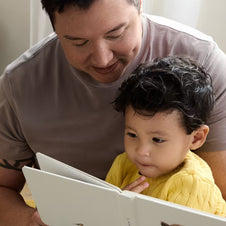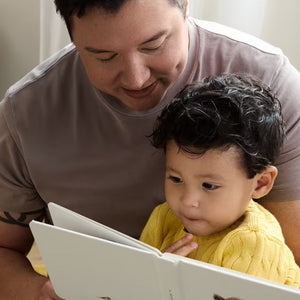Is your 6 month old struggling with sleep? You’re not alone. Many families notice changes in their little one’s sleep around six months. Let’s talk about whether you’re seeing a 6 month sleep regression and how to help your baby if sleep is rough.
Taking Cara Babies Classes
What is a sleep regression?
“Sleep regression” is a common phrase used to describe a temporary disruption in your child’s sleep, like waking more in the night, taking shorter naps, or fighting bedtime. This is common during times of developmental growth or big transitions (think: starting preschool or the birth of a sibling). Sleep can be impacted anytime your little one’s brain is busy focusing on physical, mental, social, or emotional growth.
Are sleep regressions based in science?
When a baby’s brain is busy learning new things or developing, sleep can take a back seat.(6, 9) Also, as babies grow, their sleep needs change.(2,7,8) This means a baby may begin to struggle with more night wakings, with nap refusals, and with falling asleep. When sleep is interrupted this way, it can feel like everything is moving backwards, hence the term “sleep regression.”
However, sleep isn’t actually going backwards or permanently “regressing.” Sleep skills don’t just disappear at magical ages. When I talk about common sleep regression ages, I’m talking about ages when babies and toddlers often experience periods of development (physical, cognitive, social) or commonly have a change in sleep needs (Think fewer naps, more awake time, etc..). But truly, all babies develop at their own pace, meaning sleep could be interrupted because of new skills, cognitive progressions, or physical shifts at any age.
Is there a 6 month sleep regression?
It’s possible! Babies can experience a sleep regression at any age depending on their individual development, and families might see some new sleep challenges around six months. Maybe your 6 month old is waking up at night, taking short naps, or having early morning wakings. If you’re seeing changes in sleep around 6 months, your baby may be experiencing a 6 month sleep regression.
What can cause a sleep regression at 6 months old?
Sleep regressions can happen at any age and are often tied to developmental progress. The most common ages to see sleep regressions are at 4 months, 8-10 months, 12 months, 18 months, and 2 years. At six months, we can see changes in sleep tied to developmental strides and changing sleep needs. Here are some reasons you may see a sleep regression around 6 months:
Developmental progression: Perhaps your six month old is rolling all over the place or starting to sit up using their own arms for support. You may be hearing some new sounds, like those sweet baby giggles or babbling. As your baby is learning these new skills, sleep may be disrupted.
Separation anxiety: While I usually see a major peak in separation anxiety around 8 to 10 months, it can begin developing around six months for some babies. You might notice your six month old is clingier than usual and may show stranger anxiety. Sleep can look different when a baby is experiencing separation anxiety.
Changes in sleep needs: As babies get older, wake windows need to increase. If your baby is on the lower end of the age-appropriate wake window range, slowly add a few minutes to each wake window. Be sure to give your baby a few days to adjust to each shift then reassess; gradual change will prevent overtiredness. For some 6 month olds, it may even be time to move from 3 naps to 2.
Feedings: I do tend to see an increase in distracted feedings around six months. This can impact the calories your baby consumes during the day and cause night wakings due to hunger. If you’ve also recently introduced solids, let’s consider if starting solids is causing some of your sleep problems.
Teething: During these next few months, your six month old may have some new teeth popping up. Teething can be a temporary culprit of sleep disruptions, but having a strong sleep foundation can make a big difference.
What are some signs of a 6 month sleep regression?
Here are a few signs of a 6 month sleep regression:
-
Your 6 month old is waking in the night when this wasn’t a problem before.
-
Your 7 month old cries every time you enter the nursery.
-
Your 6 month old is taking shorter naps.
-
Your 7 month old is suddenly getting upset during the bedtime routine.
-
Your 5 month old is fussy all the time and won’t sleep unless being held.
-
Your 6 month old is taking longer than 20 minutes to fall asleep for naps or at bedtime.
-
Your baby’s sleep feels “off,” and you’re not sure why.
How do I know if it’s the 6 month sleep regression or teething?
The only SURE sign of teething is seeing a tooth. Sometimes you may notice swollen gums with a little white nub prior to the tooth popping through the gums. This is typically when your little one would experience pain from teething. Teething discomfort usually occurs in the 24-72 hours before a tooth erupts through the gums.

Text version of Is it teething or a sleep regression?
| Signs of Teething | Signs of a Regression |
|---|---|
| + Swollen gums with white nubs | + Increased separation anxiety |
| + Irritability | + Protesting naps or bedtime |
| + Less interested in solids | + Waking in the night |
| + Chewing on fingers and toys | + Early morning wakings |
| + Increased drooling | + Short naps |
Whether your baby is going through a sleep regression or teething, being consistent is so helpful for keeping sleep on track. Please hear me, we always want to meet any physical need your baby has, so soothe your baby if they're in pain. Providing comfort for a night or two won’t derail a solid sleep foundation. Once that little tooth pops through, go right back to your approach to sleep. Introducing new habits during a sleep regression or teething can take a little bump in the road and turn it into an ongoing struggle.
If your baby is struggling with sleep for more than a few days and you need a plan to get back on track (or get on track), I can help. My 5–24 Month Collection will give you the tools you need to achieve solid nights, establish great naps, and handle all the bumps along the way (including regressions and teething).
Important Note: Please know, intense crying is NOT teething. If you’re seeing sudden changes in your baby’s sleep with periods of intense crying, let’s check for signs of an illness or other physical discomfort.
How long does the 6 month sleep regression last?
I want to reassure you: the 6 month sleep regression is temporary! This regression typically lasts about a week. The way to help your baby through a sleep regression is to remain consistent with your approach or follow a plan to establish healthy sleep habits. If we introduce new habits or make changes to our healthy routines, we can see a sleep regression turn into a long-term struggle. Check out my tips below to help this sleep regression pass quickly.
What can I do if my 6 month old won’t sleep? How do we get through the 6 month sleep regression?
Here are my best tips for a 6 month old who just won’t sleep:
1. Practice new skills during awake time.
Give your baby lots of floor time to practice rolling, sitting up, and just observing the world around them. The more you practice during the day, the less exciting those skills seem when your baby needs to sleep.
2. Pay attention to bedtime.
For most 6 month olds, a bedtime in the sweet spot between 7:00 and 8:00 pm can make falling asleep and staying asleep easier for your baby. A consistent bedtime routine can also help prepare your baby’s active body for sleep to set your night up for success.
3. Prioritize restful daytime sleep.
Both daytime and night sleep are vital for the major development your baby’s brain and body are experiencing around this age. If you need guidance for creating a consistent (yet flexible) daily routine, check out these sample schedules for 6 month olds.
Expert Tip: Start watching for signs it’s time to drop a nap, but don’t rush. Waiting until your baby has been consistently showing these signs for a week or two can make the transition from 3 naps to 2 much smoother.
4. Begin to expand wake windows.
Getting good awake time during the day is key for good naps and night sleep. Your goal wake windows at 6 months are 2-3 hours. BUT as your baby nears the 3 to 2 nap transition, a little more awake time and potentially more activity during that awake time may be needed.
5. Maintain adequate feedings during the day.
Continue offering feedings every 2.5-3.5 hours during the day according to your baby’s hunger cues. Remember, during feedings, a non-stimulating environment will be best to ensure adequate caloric intake without getting distracted. This leads to more consolidated sleep!
6. Stay consistent.
Being consistent, especially with routines and healthy sleep habits, is key to getting through any regression. Avoid starting new habits that you don’t want to maintain. This regression can make sleep tricky for several days, but staying consistent with your approach will help.
7. Have a plan.
If your nights and naps are rough beyond just a few days, I have a class for you! The 5-24 Month Collection will give you a step-by-step, emotionally-connected plan to restful nights and solid naps even when you experience regressions.










